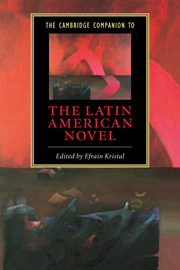Book contents
- Frontmatter
- Introduction
- Part I History
- Part II Heterogeneity
- Part III Gender and sexuality
- Part IV Six novels
- 11 Dom Casmurro by Machado de Assis
- 12 Pedro Páramo by Juan Rulfo
- 13 The Passion According to G.H. by Clarice Lispector
- 14 One Hundred Years of Solitude by Gabriel García Márquez
- 15 The House of the Spirits by Isabel Allende
- 16 The War of the End of the World by Mario Vargas Llosa
- Epilogue
- Bibliography
- Index
- Series List
15 - The House of the Spirits by Isabel Allende
from Part IV - Six novels
Published online by Cambridge University Press: 28 May 2006
- Frontmatter
- Introduction
- Part I History
- Part II Heterogeneity
- Part III Gender and sexuality
- Part IV Six novels
- 11 Dom Casmurro by Machado de Assis
- 12 Pedro Páramo by Juan Rulfo
- 13 The Passion According to G.H. by Clarice Lispector
- 14 One Hundred Years of Solitude by Gabriel García Márquez
- 15 The House of the Spirits by Isabel Allende
- 16 The War of the End of the World by Mario Vargas Llosa
- Epilogue
- Bibliography
- Index
- Series List
Summary
Isabel Allende’s La casa de los espíritus (The House of the Spirits, 1982) tells the tale of the political struggle between the Left and the Right in twentieth century Chile which led to Augusto Pinochet’s coup d'état on September 11, 1973, and the imposition thereafter of a repressive, right-wing military dictatorship. Its novelty is that it does so from the vantage point of the lives of three generations of women - Clara (grandmother), Blanca (mother), and Alba (granddaughter) - though Clara’s husband, Esteban Trueba, fulfills an important mediating function within the novel, as we shall see. Like Gabriel García Márquez’s Cien años de soledad (One Hundred Years of Solitude, 1967), the structural impetus of Allende’s novel is provided by genealogy rather than plot, though the family line traced is male-centered in the former but feminocentric in the latter. Indeed, the “house” in the title of La casa de los espíritus functions paradigmatically as an image of the intrinsically feminine.
The obvious similarities between the two novels, indeed, have led some to question the originality of Allende’s novel. In a revealing interview Allende made the following self-deprecatory comment: “Me siento como un pirata que se hubiera lanzado al abordaje de las letras” (“I feel like a pirate who has boarded the ship of letters”). There are a number of ways of interpreting this statement. One - the more cynical - is to take it as an admission of plagiarism of Gabriel García Márquez’s fiction, with which her work has so often been compared.
- Type
- Chapter
- Information
- The Cambridge Companion to the Latin American Novel , pp. 270 - 282Publisher: Cambridge University PressPrint publication year: 2005



